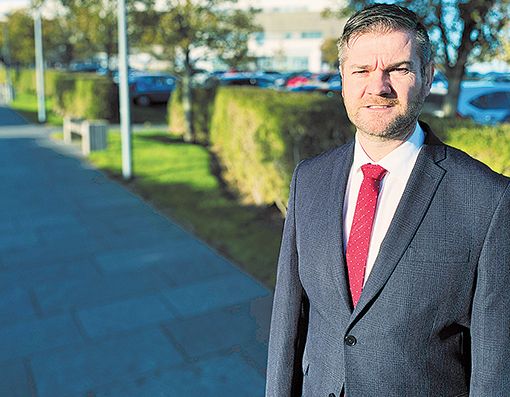Increase in admissions at Ulster due to lockdown
Increase in admissions at Ulster due to lockdown
14 July 2021

THE increased number of patients attending the Ulster Hospital is due to lockdown restrictions easing, with the return of pre-Covid demand for inpatient services placing significant pressure on its emergency department, according to senior health chiefs.
In a detailed response to South Down MLA Colin McGrath, the South Eastern Trust also confirmed that in May, nearly 1,400 people contacted the consultant-led urgent care centre at the Downe Hospital, with 1,000 of those seen by staff.
Health chiefs say those who did not attend the Downe were provided with clinical advice, which may have included contacting their GP, being directly admitted to a ward, or redirected to a “more appropriate service” to meet their care needs, or avoid delays in treatment.
The health trust said the service provided within the Downe ED is delivered by an excellent, high quality team, explaining that at the height of the pandemic, in order to protect both the small urgent care team and the local community, a clinical decision was made not to treat those who had symptoms in line with Covid-19.
Since April, following investment in additional testing capability, the health trust said it has has been able to bring more people into the service for care or treatment at the Downe.
Responding to Mr McGrath’s statement which refers to the significant in inpatient admissions directly from the emergency department into the Downe over two different time periods, the health trust insists the hospital’s inpatient areas are far from empty.
“We continue to work with our partners to ensure all bed capacity across our hospitals is managed effectively,” a spokeswoman confirmed.
“For example, in March, 209 people were admitted to inpatient areas of the Downe and in the 2019/20 financial year up to February 2020 last year, an average of 253 people per month were admitted to the Downe.
“From March until May this year we have grown our services back to almost 80% of that level, at 193 per month and the Trust’s current projections are that this will continue to grow as we rebuild services following the pandemic.”
Health chiefs say that in light of pressures on unscheduled care and to ensure that more patients can receive the appropriate care they need in a timely manner, they have been working to proactively develop alternative pathways to hospital admission, if unexpected acute medical care is needed.
The say there are a number of ways in which people can be admitted to hospital including through the urgent care centre, another emergency department, the Downe Hospital’s frail elderly rapid assessment clinic and direct admission to a ward.
“It is also important to recognise the multitude of existing services which also work to support the provision of acute care services,” the spokeswoman continued.
“This includes the development of primary care and integrated services. The Down area in particular has seen significant investment and development in these areas. For example, the development of multi-disciplinary teams enables GP practices to focus not just on managing ill-health, but also on the physical, mental and social wellbeing of communities.
“With an increased focus on prevention and early intervention initiatives, the aim is to ensure that patients’ needs are met at the earliest possible opportunity, reducing the need for onward referrals into secondary care services.”
The spokeswoman also confirmed that a following submission of a joint application with the Down GP Federation, the South Eastern Trust was successful in being chosen by the Department of Health for the first stage of the rollout of multi-disciplinary teams which commenced in 2019 in the Down area and has been working very successfully.
In addition, the health trust said that along with the Health and Social Care Board, it has supported an alternative to hospital admission through the development of the so-called enhanced care at home service.
“This has enabled patients to be cared for at home to avoid a hospital admission when this is assessed to be a medically safe option,” the spokeswoman explained.
“The care is provided by a multi-professional team with medical support through the patient’s own GP and a hospital consultant. From December 2020 to April 2021, the enhanced care at home team has treated and cared for 222 acutely unwell patients in the Down locality at home. This is the preferred alternative for many patients and their families. Many of these patients would otherwise have required a hospital admission, most probably in the Downe Hospital.”
Health chiefs say they “fully understand” the number of additional people attending the Ulster or Lagan Valley hospitals from the wider South Down area, but insist is not the reason for the significant pressure being experienced at the Ulster Hospital in particular.
“As society has exited from the restrictions of the pandemic, we have seen a return to pre-Covid demand for inpatient services, which is why the ED at the Ulster Hospital is under significant pressure,” she said.
The spokeswoman added: “Mr McGrath is quite right in highlighting the tireless efforts of our staff and the urgent reforms needed within the health and social care system to support them to deliver the best care to our patients.
“The Trust welcomes the support of elected representatives and will continue to work with Mr McGrath, other local representatives, community groups, local citizens, our staff and other stakeholders to deliver those essential reforms that deliver high quality, safe, effective, sustainable care for the communities within the South Eastern Trust area.”


